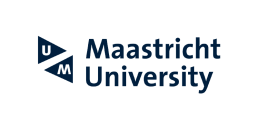Maastricht University
Maastricht, The Netherlands, www.maastrichtuniversity.nl/
Maastricht University (MU) is the most international university in the Netherlands and, with more than 16,000 students and 4,000 employees, is still growing. The university stands out for its innovative education model, international character and multidisciplinary approach to research and education. Today it is considered one of the best young universities in the world (#4 in the 2016 THE ranking of universities younger than 50 years). In FP7 MU was involved in over 150 projects with approximately 60 million euro of funding volume. In 2014 and 2015 it had reached again 50 projects with approximately 20 million euro of funding volume.
The Faculty of Psychology and Neuroscience at MU is home to the department of Cognitive Neuroscience and the Maastricht Brain Imaging Centre (M-BIC), comprising of 9 research groups, that are carrying out research on the topics such as auditory perception emotion and cognition columnar level fMRI, physiological (f)MRI, visual perception and learning, developmental neuroscience, and fMRI methods. MU will contribute to MindSpaces in addition to office space for the staff working on the project and access to the facilities, other existing smaller equipment (such as a power platform, camcorder, camera, etc.) and software (e.g., for behavioral analysis and video editing) if needed. MU has strong expertise in affective neuroimaging research mainly focused on face and body emotion recognition and regularly hosts artist residences. In the framework of the project Prof. de Gelder will organize events stimulating collaboration with artists and use the network and facilities of the non-profit organisation Fundamental Research (www.fundamentalresearch.org).
The research of the department of Technology and Society Studies focuses on Innovation Cultures and draws on a combination of philosophical, historical, sociological and anthropological approaches. The general question is how modern societies are constituted by science and technology, and how, vice versa, social and cultural conditions shape technological and scientific developments. The TSS department is part of the Faculty of Arts and Social Sciences (FASoS), that studies how major developments in societies and cultures as they have unfolded during the modern and contemporary eras. It seeks to gain understanding of the interrelationships of Europeanisation, globalization, scientific and technological development, political change and cultural innovation. It is interested in how today’s societies cope with these challenges through technologies, practices ofremembrance, governance and strategies for managing knowledge diversity and equality.
The department of Data Science and Knowledge Engineering carries out research on artificial intelligence, computer vision, image and signal processing, applied mathematics and machine learning. At DKE, SoA algorithms are developed and are applied to robotics, assisted living, surveillance, optimization, biomedicine. The department collaborates with many of the campus institutes to address and solve interdisciplinary problems.
People
Prof. Beatrice de Gelder
Professor of Social and Affective Neuroscience, Faculty of Psychology and Neuroscience, Maastricht University
Dr. Maarten Vaessen
Computer scientist and Neuroscientist
Senior Postdoctoral Researcher, Maastricht University
Prof. Harro van Lente
Professor, Science and Technology Studies
Prof. Alexia Briassouli
Assistant Professor, Maastricht University

